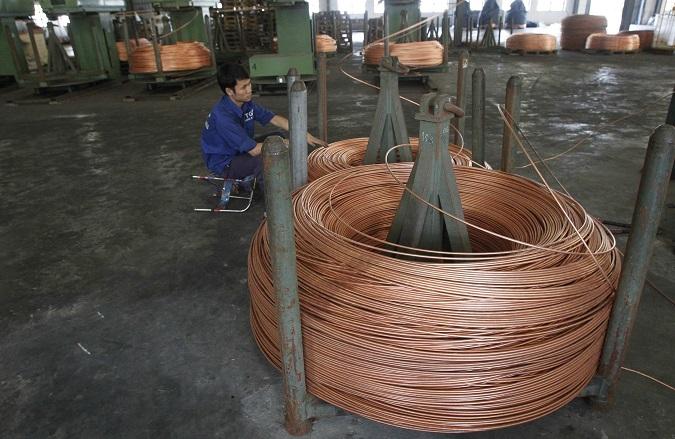Copper hits 2-week high on prospects of stimulus in China
Bareksa • 26 Mar 2014

A worker checks production of copper (REUTERS/Kham)
Three-month copper on the London Metal Exchange ended up 2.01 percent at $6,603 a tonne
Reuters - Copper rose to its highest level in two weeks on Tuesday, supported by prospects that big commodities consumer China will act to support its slowing economy and by improved risk appetite in wider markets.
World shares rose, helped by efforts by Western efforts to draw a provisional line under the Ukraine crisis and as news emerged that Moscow and Kiev's foreign ministers had held an impromptu first meeting.
U.S. consumer confidence also rose in March to its highest level since January 2008, adding to a string of positive reads that supported views that softness early this year was related to bad weather.
Last week, copper fell to three-and-a-half-year lows, with traders watching developments in China's credit markets for directional cues, after a bond non-payment by a solar panel maker aroused fears that defaults could grow.
Three-month copper on the London Metal Exchange ended up 2.01 percent at $6,603 a tonne. It rose to $6,623.75 a tonne in intraday trading on Tuesday, the highest level since March 11.
Myrto Sokou, a senior research analyst at Sucden in London, suggested copper's move higher could be related to hopes of stimulus measures in China.
Weaker-than-expected manufacturing growth in China pointed to a contraction in the first three months of the year and raised market expectations of government stimulus to arrest a loss of momentum in the world's second-largest economy.
Weakness in China worries investors because of its importance in the demand for raw materials.
"We have seen a correction higher in general in markets today. Yesterday we saw quite disappointing data from the euro zone and China and the market reacted to the tepid data," Sokou added.
Benchmark three-month nickel was last bid up 0.50 percent at $16,190 a tonne. It has gained more than 17 percent so far this year, almost retracing last year's 18 percent fall that made it the worst performing metal in the complex in 2013.
An Indonesian export ban that came into effect this year on nickel ore and aluminium feedstock bauxite has helped boost the price of nickel and underpin the aluminium price.
A drive by two big Russian producers of nickel and aluminium to get Indonesia to stick to the mineral ore export ban has added further support.
Aluminium producer United Company Rusal and Norilsk Nickel delivered a blunt message to Indonesian officials: We will invest billions of dollars in smelters only if you ban bauxite and nickel ore exports.
"Dips are being supported by stainless mills whose clients seem to have been caught out by the speed of this move up in the nickel price," broker Triland said in a note.
Benchmark three-month aluminium ended up 1.27 percent at $1,752 a tonne. Aluminium has fared less well than nickel, falling around 2.6 percent so far this year because of a chronic market surplus.
Benchmark three-month tin ended up 1.20 percent at $23,200 a tonne. The metal has risen around 3 percent so far this year.
Indonesia's top tin miner, PT Timah, said it expects the global tin supply deficit to grow to 20,000 tonnes in 2014 from 7,400 tonnes in 2013 as shipments suffer from rules making tin trading on an Indonesian bourse compulsory.
Benchmark three-month lead was last bid up 0.58 percent at $2,084 a tonne, while zinc was last bid up 2.31 percent at $1,990 a tonne having hit a near two week high earlier of $1,997.75 a tonne.